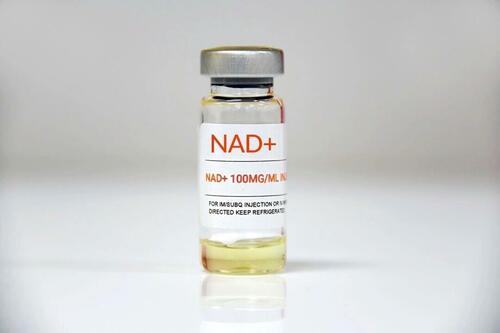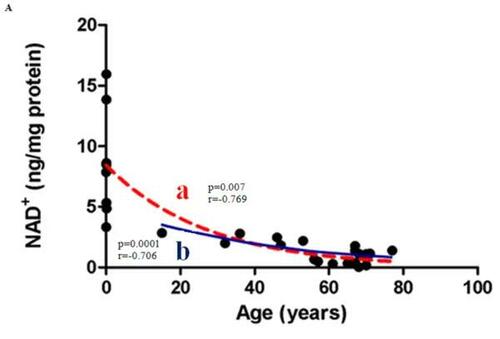Exploring NAD+: Is It Really A Key To Longevity?
Authored by Jennifer Sweenie via The Epoch Times (emphasis ours),
Short for nicotinamide adenine dinucleotide, NAD+ supplements are being studied for their effects on cellular energy production, mitochondria function, and DNA repair. Before reaching for a supplement, though, it’s important to explore the role of NAD+ in the body and the existing evidence on its ties to longevity, as well as ways to boost NAD+ levels naturally.
As researchers work to uncover the mechanisms behind aging, NAD+ has emerged as a promising therapeutic.
What Is NAD+?
NAD+ is a coenzyme, a small molecule that acts as a catalyst for enzymes to perform their functions. NAD+ is found in all cells in the body and has a critical role in transferring energy within our cells.
NAD+ is involved in various metabolic processes, including converting the food we eat into the energy our cells need to stay alive. It helps generate adenosine triphosphate (ATP), a final product our bodies can use. ATP is the end fuel source all our cells use. Without NAD, you cannot make ATP—an essential part of life.
NAD vs. NAD+
NAD+ is the functional form of NAD in the body. Although these terms are sometimes used interchangeably, they are not the same molecule.
“NAD+ is the one we are primarily focused on when it comes to longevity, cellular health, and energy,” Dr. Orel Swenson, founder of Aeonic Health, a regenerative and longevity medicine practice based in Boston, told The Epoch Times in an email.
As observed in mouse models, NAD+ levels naturally drop as we age. By the time we reach middle age, our NAD+ levels are at half of what they were in our youth.
“NAD+ levels decline naturally with age partly because the accumulation of DNA damage and loss of mitochondrial efficiency demand more and more NAD+,” said Swenson.
NAD Supplementation
A few existing methods to restore NAD+ levels include oral supplements, nasal sprays, transdermal patches, self-injections, and fusion therapy. The main differences lie in the delivery. Some methods are considered faster and more effective than others.
NAD+ itself isn’t really a supplement that can be effectively taken by mouth. The bioavailability is quite limited this way,” said Swenson.
For this reason, other methods of administering NAD+, such as via IV infusion or subcutaneous injections, are growing in popularity.
“Unsurprisingly, when taking an oral supplement, the increase in your NAD+ levels is more gradual. Infusions and injections are much quicker but are more expensive and require clinician oversight for safety,” he said.
“When given this way, it’s imperative to work with a healthcare professional familiar with NAD+ administration, as it can cause nausea, headaches, fatigue, and even low blood pressure if given incorrectly,” he continued.
NAD+ Precursors
Precursors are molecules that are converted into another substance or compound by a chemical reaction. NMN (nicotinamide mononucleotide) and NR (nicotinamide riboside) are substances the body can use to produce NAD+. While NAD+ is more challenging for the body to absorb, these precursors are more easily converted into NAD+.
“NMN needs fewer steps (i.e., it is closer to becoming NAD+) than NR, but both are available as oral supplements with good bioavailability,” explained Swenson.
A study published in GeroScience in 2023 determined that NMN supplementation increases blood concentrations of NAD+ and is safe and well tolerated in oral doses of up to 900 mg per day.
NR, a new form of vitamin B3, is also recognized as safe and effective in raising NAD+ levels at a cellular level. NR oral supplements are often found at a lower price point than NMN varieties.
Swenson explained the role of NAD+ in terms of longevity in four points. As a coenzyme, it interacts with other enzymes in the body to facilitate:
- ATP production: NAD+ acts as a coenzyme, interacting with other enzymes in the body to produce ATP, the final energy source for cells.
- Mitochondrial health: Mitochondria can be likened to a refinery or power station where ATP production takes place. NAD+ is essential for maintaining optimal mitochondrial function and for mitochondrial biogenesis, which involves the creation of new mitochondria.
- DNA repair: Sirtuins are signaling proteins that have a critical role in the aging process, including energy metabolism, inflammation, and extending lifespan. By interacting with sirtuins, NAD+ mediates the repair of damaged DNA, which accumulates as people age.
- Reduction of inflammation: NAD+ plays a role in reducing inflammation. As we age and levels decline, we may experience an accumulation of inflammation, known as “inflammaging.”
A review published in The International Journal of Molecular Science concluded that the existing research on the benefits of NAD+ on aging and healthspan is currently based on cell cultures and model organisms, and research on humans is warranted. Further research is also needed on long-term effects and dosage.
Swenson concluded, “It [NAD+] does not represent a magic bullet, but rather should be viewed as part of an overall strategy for maximizing healthy aging.”
Gauging NAD+ Levels
There may be too much of a good thing, as high NAD+ levels have been linked to cancer and impact immunity. Existing evidence on the exact mechanisms of the connection is limited. However, NAD+ levels seem to have both pro- and anti-cancer effects. It may serve as a protective factor early on in cancer development but as a promoting factor later in the progression of the disease.
A study published in Nutrients found that “Replenishing NAD pools by NR could inhibit tumor growth and cancer metastasis as well as promote the overall health status of tumor-bearing mice.”
Specifically, the authors suggested that boosting NAD by NR supplementation could be a novel strategy to prevent the progression of hepatocellular carcinoma.
Read the rest here…
Tyler Durden
Mon, 10/21/2024 – 02:45
via ZeroHedge News https://ift.tt/2vS7QEb Tyler Durden

